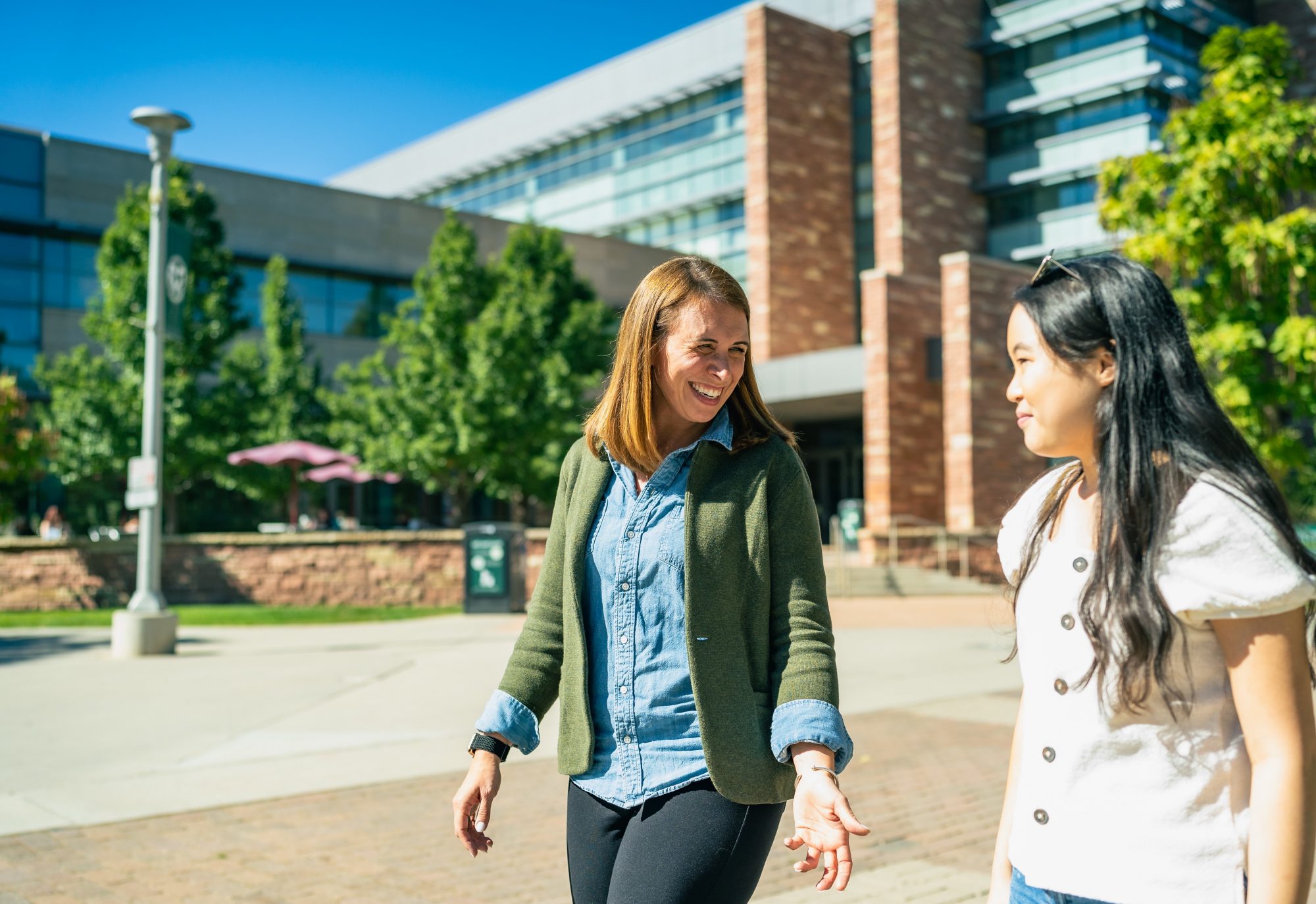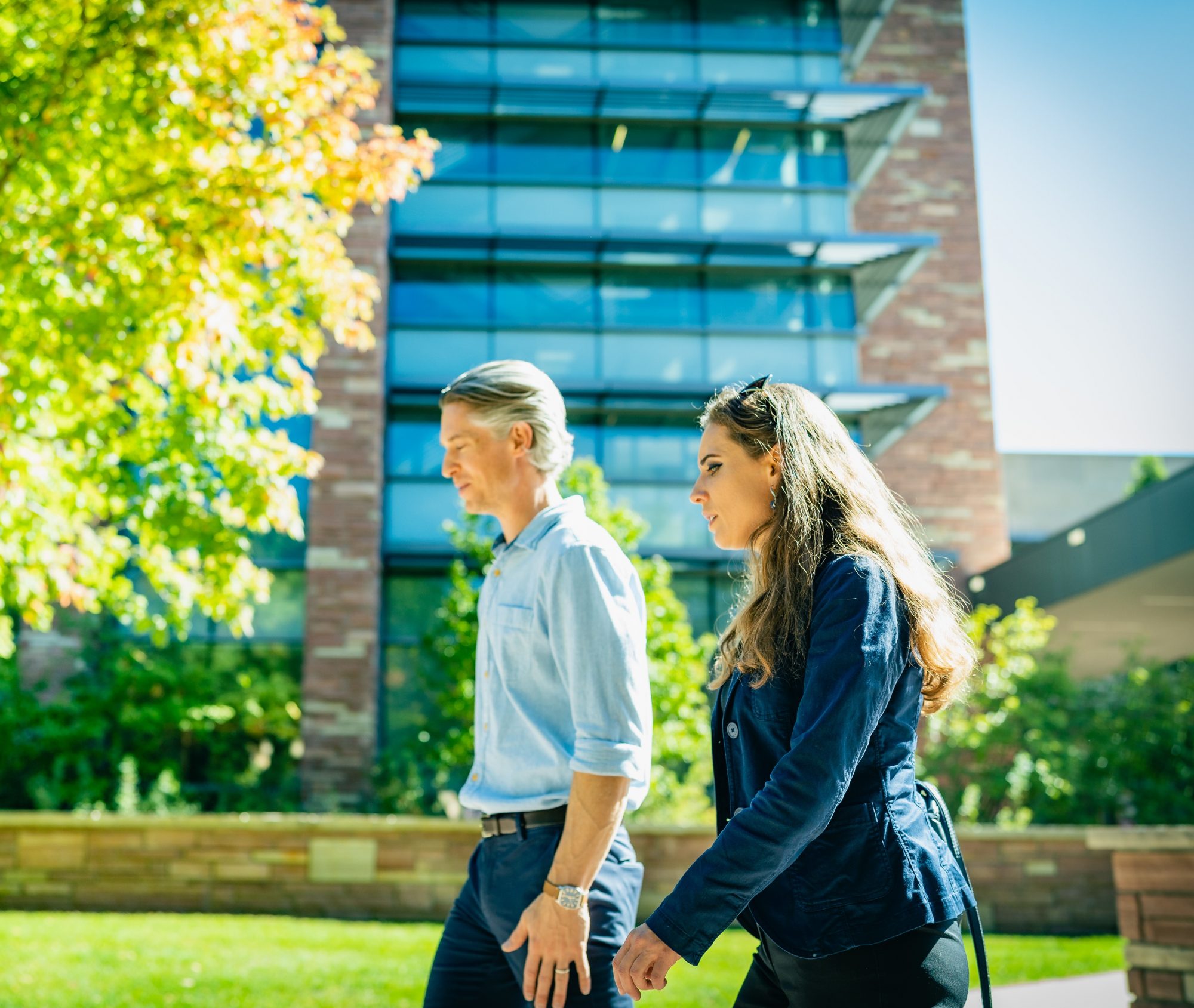
Why Choose CSU
Why Choose CSU
Flexibility. Rigor. Mentorship. Community.
Graduate studies in communication at Colorado State University attract students from around the world who deeply value teaching, scholarship, community and excellence.
Our faculty is second to none in their commitment to collegiality and rigor, providing graduate students unmatched mentoring in both teaching and scholarship across three areas of specialized study.
You will partner with faculty, develop close bonds with your cohort, and earn a degree that will advance your career, whether inside or outside academe.
Our program will afford you the space to explore new ideas, the resources to shape your future, and an environment in which to thrive.
The graduate program of the Department of Communication Studies values the following:
- Developing a broad understanding of the discipline
- Building a breadth of methodological tools to address different questions or provide critique
- Producing original work which contributes to conversations in both academic and non-academic communities
- Cultivating scholarly voices that represent differing perspectives—both written and oral
- Training outstanding teachers who value teaching as a core facet of academic life
- Fostering a culture that encourages students to be thoughtful professionals
- Learning time management skills to successfully negotiate the demands of research, teaching, and service
- Promoting a more inclusive community in line with the Principles of Community both here at CSU and within the discipline of Communication
See for yourself what our faculty and students have to say about studying communication at Colorado State:
Ph.D. in Communication
Our doctoral program offers a rigorous scholarly experience with maximum flexibility.
- Candidates develop programs of study tailored to their unique professional goals, choosing courses from our three departmental specializations.
- Doctoral students teach a variety of undergraduate courses, and they are mentored by acclaimed scholars engaged in leading-edge research.
- We have distinctive programmatic features that you won’t find anywhere else in the nation, including the Center for Public Deliberation and the ACT Human Rights Film Festival.
- We train students as scholars, practitioners, and professionals who are well-prepared for the academic job market and skilled at translating their research for diverse civic and professional audiences.

Ph.D. in Communication
Our doctoral program offers a rigorous scholarly experience with maximum flexibility.
- Candidates develop programs of study tailored to their unique professional goals, choosing courses from our three departmental specializations.
- Doctoral students teach a variety of undergraduate courses, and they are mentored by acclaimed scholars engaged in leading-edge research.
- We have distinctive programmatic features that you won’t find anywhere else in the nation, including the Center for Public Deliberation and the ACT Human Rights Film Festival.
- We train students as scholars, practitioners, and professionals who are well-prepared for the academic job market and skilled at translating their research for diverse civic and professional audiences.
M.A. in Communication Studies
Our M.A. degrees offers an introduction to the field of Communication Studies, with core courses in our three areas of study and instruction in critical and social scientific research methods.
Thesis Track
- Students augment our M.A. core with electives of their choosing and they complete a master’s thesis under the advisement of a faculty committee.
- Thesis track students hold Graduate Teaching Assistantships and are the instructors of record in their own sections of public speaking and may assist faculty in other courses.
- Our award-winning instructor training prepares graduate students to succeed as teachers, and the professional experience gained in the classroom is valued by employers in diverse contexts.
Deliberative Practices Track
- The deliberative specialization augments our regular M.A. core and elective curriculum with coursework and research in public deliberation.
- Working with our nationally recognized Center for Public Deliberation, students are trained as impartial facilitators and gain experience designing and running deliberative processes in the local community.
- Deliberative Practices students complete an applied research project that supports the mission of the CPD and/or relates to public deliberation. They are also eligible for Graduate Teaching Assistantships.
Faculty Areas of Specialization
Faculty research and teaching within the Department of Communication Studies is organized around three main areas of specialization: Film and Media Studies, Relational and Organizational Communication, and Rhetoric and Civic Engagement. However, students nor faculty are siloed into one of these areas. Scholarship is fluid across these areas. Students benefit greatly from exposure to all three areas and develop a program of study tailored to their professional goals.
Watch the short videos below for an overview by faculty on each area, or take a deeper dive into faculty expertise on our Faculty Areas of Specialization page.
Film & Media Studies
Classes in this area examine television, film, new media, and music and their relationships to culture and society.
Sample classes:
- SPCM547 – Media Industries
- SPCM548 – Media Texts
- SPCM549 – Media Audiences
- SPCM550 – Contemporary Issues in Media
- SPCM646 – Media Theory
Relational & Organizational Communication
Classes in this area explore the verbal and nonverbal aspects of interpersonal, small group, co-cultural, intercultural, and organizational communication.
Sample classes:
- SPCM532 – Theories of Interpersonal Communication
- SPCM533 – Discourse, Work, and Organization
- SPCM534 – Communication and Cultural Diversity
- SPCM539 – Communication Theory
- SPCM638 – Communication Research Methods
Rhetoric & Civic Engagement
Classes in this area explore the ways that public discourse is used to persuade and influence others across a range of rhetorical texts including speeches, political artifacts, architecture, photography, and museums.
Sample classes:
- SPCM504 –Rhetoric of Everyday Life
- SPCM511 – Topics in Public Address
- SPCM520 – Rhetoric and Public Affairs
- SPCM523 – Feminist Theories of Discourse
- SPCM540/ETST540 – Rhetoric, Race, and Identity
- SPCM601 – History of Rhetorical Theory
- SPCM612 – Rhetorical Criticism
Program Benefits & Perks
We support graduate students with comprehensive funding, competitive opportunities, and transformative resources.
Teaching Assistantships
- Funding duration: M.A. 2 years | Ph.D. 4 years
- Tuition covered. Student pays fees.
- 9-month stipend
- Extensive training, including graduate seminars in pedagogy and professional development, and one-on-one faculty mentoring.
Conference Travel Support
- Reimbursable expenses that vary by year and destination.
- M.A. 1 conference | Ph.D. 2 conferences
Competitive Opportunities
Diverse Teaching Assignments
- M.A. and Ph.D. students serve as the instructor of record in Public Speaking
- M.A. and Ph.D. students support undergraduate courses taught by tenure track faculty and large lecture recitations
- Ph.D. students teach a variety of upper-division classes
Research Experience
- Support tenure track faculty with grant-funded projects and summer research assignments
Funding
- Grants to support thesis and dissertation research, including research site visits, travel to archives, survey and experiment costs, transcription fees, and compensating research participants
Department Resources & Programs
Communication Research Lab
Dedicated space to conduct interviews, focus groups, and experimental research, including VR and biomarker testing.
ACT Human Rights Film Festival
Attend and help produce Fort Collins' annual film festival dedicated to human rights.
Center for Public Deliberation
Design and run deliberative processes on campus and in the community in partnership with nationally recognized deliberation scholars.
Graduate Certificates
Pursue certificates in gender studies, teaching, and other subjects at Colorado State.
How to Apply

To apply to a graduate program in Communication Studies at Colorado State University, prospective students must submit an online application and application fee.
The following items are required for application to a graduate program in Communication Studies at Colorado State University:
- Official transcripts from all colleges or universities attended
- Statement of Purpose
- Writing sample
- Resume/CV
- Three letters of reference
If you are an international student and have not recently earned a degree at an American university, our program requires the following minimum English test scores:
- TOEFL
- Composite score: 102
- Reading: 20
- Listening: 22
- Speaking: 25
- Writing: 20
- IELTS
- Composite score: 7.5
- Reading: 6.5
- Listening: 6.5
- Speaking: 7.5
- Writing: 6.0
If international candidates move through the screening process, they will also be asked to participate in an interview with the admissions committee.
Please see https://graduateschool.colostate.edu/admissions-resources/english-proficiency/ for information about exemptions to submitting TOFEL scores.